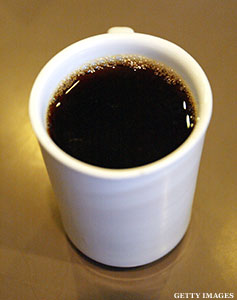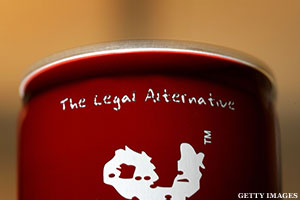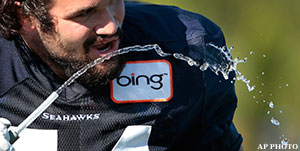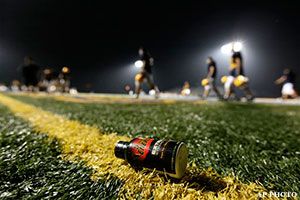
When you think of substances on the NCAA's banned drug list, your mind probably races to steroids, HGH, and multisyllabic chemicals ending in –ol.
But how about caffeine?
It's true: Caffeine is not only mentioned, but mentioned prominently by the NCAA on its drug list. The No. 1 classification of banned substances is "stimulants" and examples of those include "amphetamine (Adderall); caffeine (guarana); cocaine; ephedrine" and several others.
Now, it’s not like USC's Matt Barkley or Michigan's Denard Robinson are getting kicked off the field for drinking gas station coffee. Caffeine can have health benefits, after all. And according to a study by the National Strength and Conditioning Association, a 220-pound athlete would need to drink "1.5 to 5 average-sized cups of coffee to potentially enhance performance." (Calls to the NCAA about what would trigger a positive test were not returned.)
But most NCAA athletes are lighter and could potentially get benefits from one or two cups. How can anyone tell how much is too much? That's the problem. There is no caffeine warning label. And there is no federal rule about showing the amount of caffeine in a beverage, although the American Beverage Association points out some makers voluntarily put labels on their products.
"If you look at a can of cola, you usually won’t find caffeine content," says Ed Wyszumiala, General Manager of NSF International's Dietary Supplement Certification Programs. "You won’t find it for brewed tea or a chilled coffee drink either."
So while something like Adderall is obviously dangerous to an athlete, caffeine can be troublesome because nobody suspects it can do much harm.
And that could lead to dangers aside from a positive drug test.

Experts say 400 mg of caffeine can lead to cardiac symptoms, like heart palpitations. NSF International refuses to certify any beverage that has more than 150 mg of caffeine. That seems like a lot, considering a can of soda has roughly 25 mg of caffeine and a cup of coffee has around 100 mg. But combine a strong cup of coffee and an energy drink -- often loaded with caffeine -- and you've got a recipe for a crisis. A can of Red Bull has about the same amount of caffeine as a cup of coffee -- nothing dangerous by itself -- but in 2000, an Irish athlete named Ross Cooney died after drinking several cans of Red Bull after a basketball game.
"In the case of athletics, when people get dehydrated, stimulants have a different effects," says Wyszumiala. "Your body’s under a lot more stress. Your kidney is functioning differently, your heart, your liver. You can have everything from heart arrhythmia to cardiac events."
Athletes often have no idea they are drinking too much caffeine because they confuse sports drinks -- like Gatorade -- with energy drinks, like Red Bull, Amp and Monster. Energy drink companies sponsor sporting events and even teams, but experts are worried they can cause harm if consumed in high quantities either with other caffeine drinks or with certain drugs, like Ritalin, which some young people take for ADHD. This is not to mention athletes with unknown heart ailments. Rapid heart rate is a common effect of too much caffeine.
"Caffeine is a diuretic -- you don't want that," says Mary Claire O'Brien, Assoc. Prof of Emergency Medicine at Wake Forest Baptist Medical Center. "You don’t want to drink that in the context of exercising. You want to hydrate. Energy drinks are not the same as sports drinks. There's nothing wrong with drinking a Five Hour Energy like an afternoon tea or coffee, but it's not appropriate for use with sports. You wouldn't drink a cup of coffee in the middle of a basketball game."
Caffeine isn't even labeled as such in some cases. Ingredients like "guarana" and "kola nut" sound exotic but they are just pseudonyms. And then there's taurine, the magical amino acid that gives Red Bull its name. It comes from "taurus" because it was originally derived from ox bile in the 1800s. Some say taurine combines with caffeine to give athletes a spark -- or "wings," in the words of marketers -- but that’s unproven. The National Strength and Conditioning Association study concludes: "Despite the great deal of data on the active ingredients in energy drinks (caffeine and carbohydrates), there is limited data to show that they enhance aerobic or anaerobic exercise performance."

Many experts say if you eat three meals a day -- and most athletes do -- the need for caffeine and energy supplements is negligible. "In mice, there’s some evidence it alleviates muscle fatigue," says O’Brien. "There’s no evidence of the same in humans. You're going to get plenty of amino acids if you have a healthy diet. It’s not necessary to supplement."
So caffeine either has no effect, a minor positive effect, or, when taken by the wrong person at the wrong time in the wrong doses, can hurt. That’s especially the case on hot days, when the body needs fluids instead of stimulants.
"You really shouldn't need these energy boosters," says Peter Vitanzo, a team physician for the Philadelphia Phillies. "If athletes are exercising regularly, they shouldn't need them. And they may interfere with ability to dissipate heat effectively."

And while a cup of Folgers isn't going to get you in trouble with drug testers, the wrong energy drink could lead you down a slippery slope in pro sports. That's part of why the Arizona Diamondbacks and Houston Astros no longer provide energy drinks in their clubhouses. Two years ago, Astros pitcher Wesley Wright was hospitalized for dehydration after drinking several cans of Red Bull.
"You can drink a pot of coffee and be fine," Vitanzo says. "But some of the other stuff may be prohibited. If some have a stimulant and it comes up positive, you can lose 50 games. You don’t know if byproducts are in there. You have no defense against it."
Athletes are going to continue to consume both coffee and energy drinks. The problem -- especially for the young -- is consuming them together. Coffee certainly isn't like alcohol, but both can dehydrate and both can sneak up on those who aren't careful.
"We don't know the effects of caffeine," O’Brien says, "until we've had too much."
Popular Stories On ThePostGame:
-- Video: Clever Handball Trick Shot Wows Spectators
-- The NFL's 10 Most Successful Cheerleading Squads
-- Leigh Steinberg: Setting The Record Straight On Bankruptcy, Addiction And Career
-- Former Olympic Gymnast Raj Bhavsar Soars In Second Career With Cirque Du Soleil








